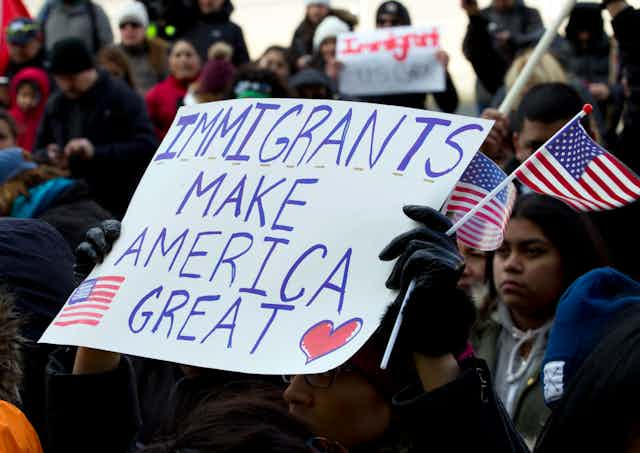One of President Donald Trump’s main arguments for his “zero tolerance” immigration policy is that immigrants are bad for the economy and cost U.S. citizens jobs.
Is he right?
Economists and other scholars have been tackling this topic for years, resulting in many studies that explore the effect immigrants of different stripes have on the economy.
All in all, scholars who have written for The Conversation have concluded immigration’s impact is actually quite positive.
1. A complex reality
It’s a common belief that immigrants hurt the economy, says Kevin Shih, assistant professor of economics at the Rensselaer Polytechnic Institute.
“A central issue is that it is easy to think that the labor market is a zero-sum game and the number of jobs available is fixed,” writes Shih. “The reality, however, is much more complex.”
An immigrant interested in the same job as you might reduce your odds a bit, but another with a good idea might end up creating hundreds of thousands of jobs, he writes.
In reality, the number of available jobs in an economy isn’t fixed; it’s always in flux. And since 2010, it has been steadily rising, which “means more jobs for everyone.”
In addition, Shih explains, “Both individual workers and employers constantly readjust to changing conditions. In fact, many economists have found evidence that natives quickly adjust to the labor market forces of immigration and in a way that often yields positive benefits.”

2. Value in diversity
Despite this evidence, politicians continue to use similar “bad for the economy” arguments to push for limits on legal immigration to the U.S. The House, for example, has been considering legislation that would end the green card lottery and move the U.S. toward a merit-based system.
That would be a big mistake, argues Ethan Lewis, an economist at Dartmouth College. Immigrants who come to the U.S. with the green card lottery tend to have diverse backgrounds and skill sets that are different from Americans.
“The key thing to bear in mind is that the more homogeneous and similar immigrants are to natives, the greater the odds they’ll in fact have a negative effect,” he explains.
But that’s what a point-based system of immigration would do by encouraging stronger English and technical skills, making them more likely to compete with U.S. citizens already living in the country, Lewis writes.
The value of diversity is one reason why at least some Republicans are actually in favor of helping the “Dreamers,” or the approximately 1.8 million immigrants brought to the U.S. as children.
3. Vital to the economy
Speaking of undocumented immigrants, an estimated 11 million currently live in the U.S., and the vast majority have become vital to the U.S. economy and several key industries says Mary Jo Dudley, director of Cornell Farmworker Program at Cornell University.
While undocumented immigrants make up 5 percent of the overall workforce, they comprise more than half of the nation’s farmworkers and 15 percent of construction laborers, she notes.
With the number of workers needed in those jobs set to soar in the coming years, the need for undocumented workers in the U.S. will only grow. The rise in border enforcement and immigration raids “has meant fresh produce has been gone unpicked, left to rot in fields,” Dudley writes.
“One New York apple grower told us that due to labor shortages and dwindling prices for his red delicious variety, he plans to let his 100-year-old orchard go, because any investments in production would result in significant economic loss,” she says.

4. Don’t forget about demand
Economists talk a lot about supply and demand. The president, in speaking about the immigration issue, usually focuses on supply. For example, when commenting about immigration from Mexico in 2016, he insisted that “when Mexico sends their people, they’re not sending their best.”
But demand is equally and perhaps even more important, explains Lise Nelson, associate professor of women’s, gender and sexuality studies and associate professor of geography at Pennsylvania State University.
“Over the last two decades, U.S. recruitment of workers without documentation has drawn millions over the border even as we have invested billions in policing, barricades and surveillance on that same border,” she writes.
Her research showed that many companies have organized their businesses around an immigrant labor force. Owners often told her that undocumented workers cost less and work harder than Americans.
In fact, economists estimate that if we deported all undocumented workers – as Trump has in the past proposed – GDP would fall 5.7 percent, Nelson writes. Instead, she suggests the U.S. give them a path to citizenship.
“Their improved situation would actually help level the playing field – eliminating the unfair advantage of illegal status in the labor market – for non-immigrant workers,” she argues. “Legalization and a path to citizenship not only provide a ethical path out of our current situation, they make economic sense as well.”
Editor’s note: This article is a roundup of stories from The Conversation’s archive.

